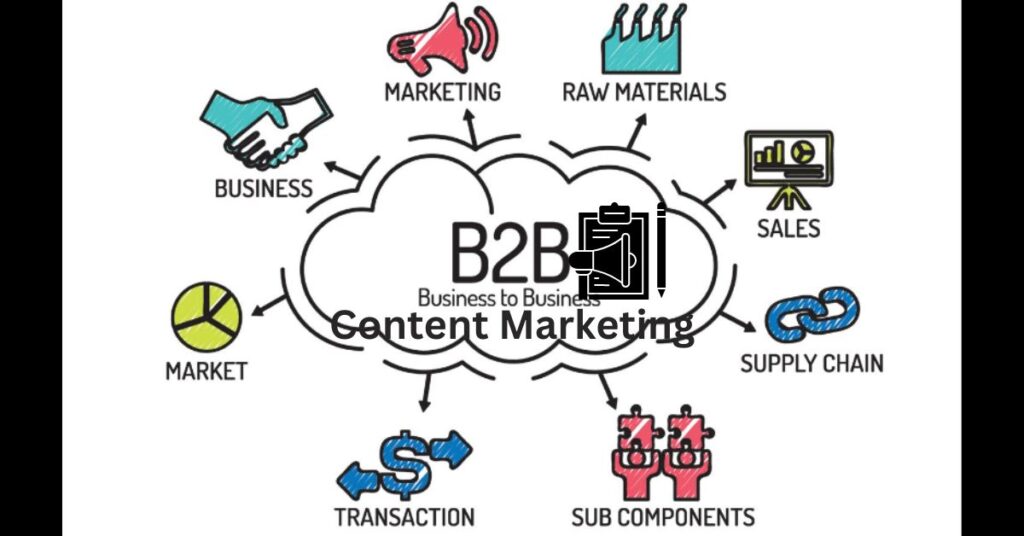B2B content marketing is a tactic that places an emphasis on businesses, encourages connections, and offers solutions to the issues that organizations face. B2B content marketing makes use of appealing content formats, such as articles, infographics, whitepapers, videos, and others, to engage the audience.In the digital age, content marketing has an impact on SEO tactics, email campaigns, social media, and online platforms.So it fosters corporate expansion, strengthens customer loyalty to brands, and aids in strategic decision-making for businesses.
The Foundation of B2B Content Marketing
B2B content marketing develops as a strategic domain in the cutthroat environment of contemporary business. As companies work to stand out in increasingly competitive markets. Business-to-business (B2B) content marketing is an important tactic that encourages connections, fosters trust, and supports growth inside the corporate ecosystem.
Compared to usual advertising, it is unique.focuses on producing useful material that, without being intrusive or impersonal, addresses the unique needs and problems of businesses.B2B content marketing seeks to educate and engage other companies by creating and spreading helpful information. Such a strategy goes above and beyond typical sales pitches and seeks to build a foundation of knowledge and authority.
The digital revolution brought in an exciting new era for B2B content marketing. This has made it possible for companies to employ social media, data analytics, and internet platforms. Because this transformation must continue as consumer behavior changes and more buyers are turning to information before making decisions.
A successful B2B content marketing strategy presents a business as a trusted expert who can help prospects along the way and elevate the brand to the forefront of the sector dialogue. Any business that wants to be competitive and relevant in this rapidly evolving sector must be aware of the challenges that B2B content marketing presents.
Digital Transformation and Its Impact on B2B Marketing

The digital age has changed how companies run and communicate with one another. B2B content marketing is impacted by this tendency as well. For instance, it urges advertisers to use digital platforms and strategies to successfully reach their target demographic.
Marketers must focus on these channels if they want to stay current as B2B buyers rely more and more on internet channels. A strategy modification that integrates data-driven insights and uncommon experiences is necessary due to the change. When businesses embrace digital transformation in B2B marketing, they become more visible. They can create reliable digital connections and engage in real-time customer conversation.
Change in Purchaser Conduct From Conditional to Social
Modern B2B clients want more than simply products or services; they want a valued partnership. Because of this shift in consumer behavior, alliances have been formed by producing content that addresses problems, challenges, and solutions.
Today’s B2B customers demand for real partnerships rather than just discounts. The shift in consumer behavior emphasizes the importance of connections. So, tailored communications, reliable information, and a focus on solving the specific issues and goals of businesses.
Data-Driven Insights
Enhancing B2B content marketing strategies requires data analytics. Marketers may improve their strategies for better outcomes by looking at analytics to identify which techniques are effective and ineffective.
B2B Content Marketing’s SEO Role

B2B content can be found by the proper audience thanks to search engine optimization (SEO). Businesses may improve their online visibility and draw in high-quality leads by optimizing their content for relevant terms and search intent.
Social Media Amplification
Websites like social media give businesses a solid distribution platform for content. Using social media amplification strategies, businesses may be able to reach more clients and build relationships with decision-makers.
The reach of B2B material is greatly impacted by social media channels. By selecting and sharing excellent information with care, businesses may expand their influence. Online company visibility is increased by posts that promote connections, convey thought leadership, and are captivating.
Influencer Partnerships
Influencers can assist in promoting content and the business as a thought leader in the sector. Successful people who are well-known in their field are considered influencers. By cooperating with other companies and utilizing their experience to entice a loyal audience, businesses may boost the authority, credibility, and reach of their content.
Interactive Content
Interactive content like calculators, tests, and quizzes can help B2B audiences become more engaged. It provides a completely immersive experience that instructs while teaching key knowledge.
What is B2B Content Marketing Strategy?

An approach to B2B content marketing tries to include, educate, and ultimately persuade other companies to become clients. It is used by businesses as part of a clearly defined strategy to create and share high-quality content. This strategic approach goes beyond conventional advertising by emphasizing relationship-building, creating authority, and providing solutions customized to the specific needs of B2B audiences.
B2B content marketing plan
An effective B2B content marketing strategy includes a number of interconnected procedures. The target market must be identified first. Finding out the issues, objectives, and challenges that businesses in the selected industry face is necessary for this. With this information, businesses can create content that engages consumers and successfully resolves their needs.
Types of content
Following that, the plan describes the many types of content that will be produced. These include blog posts, whitepapers, e-books, movies, webinars, infographics, and a variety of other media kinds. Every piece of content has a goal, whether it’s to educate potential clients, show thought leadership, or provide practical answers.
Target audience on digital channels
An important component of a B2B content marketing strategy is the distribution channels employed. Utilizing digital channels, which are where customers are most active, such as company websites, social media, email campaigns, and industry forums, businesses may communicate with their target market. Making content search engine-friendly can help businesses gain more visibility and organic visitors.
High-quality material that is regularly released builds credibility and keeps visitors interested. A writing schedule ensures a consistent flow of information, minimizing gaps that may impede audience expansion.
Tracking Key Performance Indicators
Analysis and measurement are also crucial elements. Businesses can evaluate the success of their plan by tracking key performance indicators, or KPIs, such as website traffic, engagement metrics, lead generation, and conversion rates. With this data-driven methodology, it is feasible to continuously develop and improve.
B2B Content Marketing Examples

B2B content marketing lives on originality and variety because it helps organizations to customize their tactics to the particular demands and requirements of their target market. Here are a few examples of B2B content marketing that works to demonstrate how adaptable and powerful this approach is.
1. Informative Blog Posts
A business becomes a useful resource by sharing market insights, best practices, and how-to guides through carefully designed blog entries. Such as these articles provide advice while addressing problems and showcasing their knowledge.
2. Engaging Case Studies
Case studies give real-world examples of how one company’s product or service assisted another in solving a specific issue. The instances mentioned offer convincing evidence for the advantages being touted.
3. Attractive Webinars
By offering webinars on relevant topics, businesses may share information, reply to questions, and interact with customers in real time.
4: Inspiring eBooks and Whitepapers
Numerous white papers and eBooks examine difficult industrial issues and provide comprehensive solutions. These in-depth articles assist a company in increasing its authority and luring more picky customers.
5. Engaging Videos
Information is graphically expressed through video content including thought leadership interviews, how-to guides, and product demos.
6. Interactive quizzes and assessments
Engaging interactive material like quizzes and exams involves involving the audience as active players. These technological advancements function as lead generation tools as well as teaching resources.
7: Thought Leadership Articles
Publishing thought leadership content on a company’s website or in specialized publications establishes authority, promotes discussion, and builds credibility.
8: Information graphics and visual materials
A graphical depiction makes it easy to comprehend complex information. Charts, graphs, and infographics can all be used to visually portray information.
9. Email Marketing
Email campaigns that are personalized and segmented distribute tailored material to designated audience groups, nurturing leads and maintaining their interest.
10. Content on Social Media
Through social networking sites, you may publish succinct informative articles, company news, and interact directly with your audience. Businesses and influencers can work together to reach a bigger audience.
11. Podcasts and Audio Content
Busy B2B workers may learn on the fly and network through meaningful dialogue with podcasts.
12: User-Generated Content
Customers’ testimonials, suggestions, and use cases serve as evidence of a product or service’s authenticity and reliability.
Summery
B2B content marketing was created in response to how business is developing today. Data-driven strategies, individualized interactions, and digital transformation can help B2B marketers engage their target audience and promote business success.
In the fast-paced environment of contemporary commerce, this method fosters brand loyalty and industry thought leadership at the same time.
Frequently Asked Questions
Why is personalization important for B2B content marketing?
Through the modification of data to accommodate particular commercial needs, personalization enhances engagement.
How can B2B businesses utilize their relationships with influencers?
B2B businesses can boost their credibility and clients by collaborating with powerful industry leaders.
What role does data analytics play in the creation of content?
Data analytics enhances strategy and content for better results.
Why is video content so important in B2B marketing today?
Video piques viewers’ interest and provides a useful way to convey concepts.
What sets account-based marketing apart from standard B2B advertising?
The use of account-based marketing encourages focused connections with chosen target accounts.

